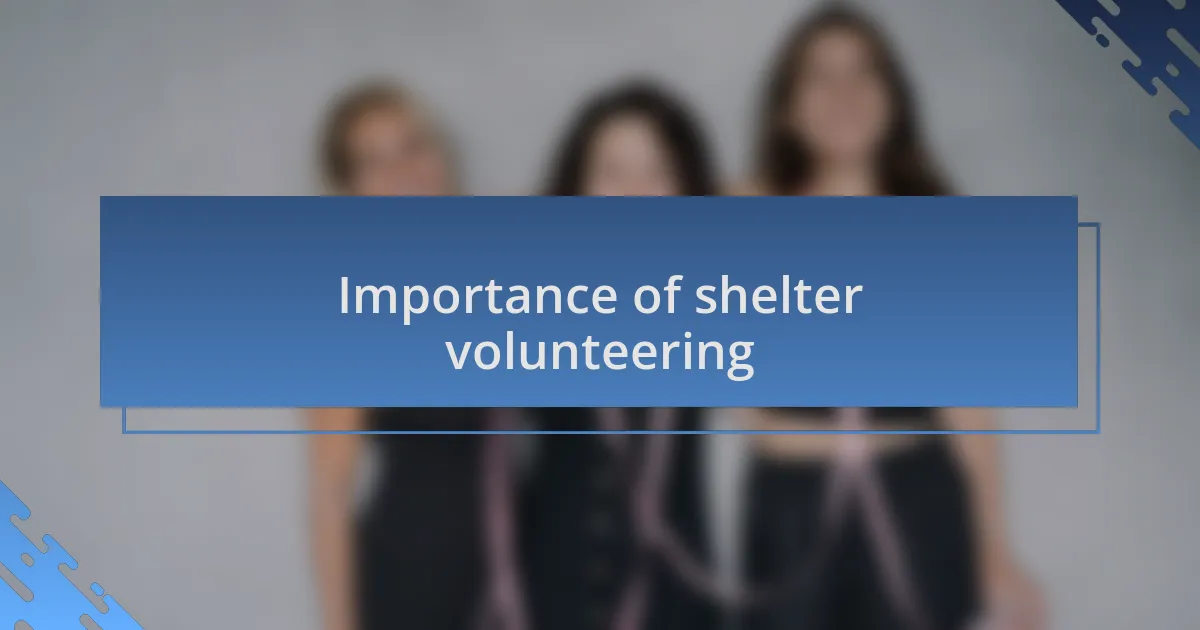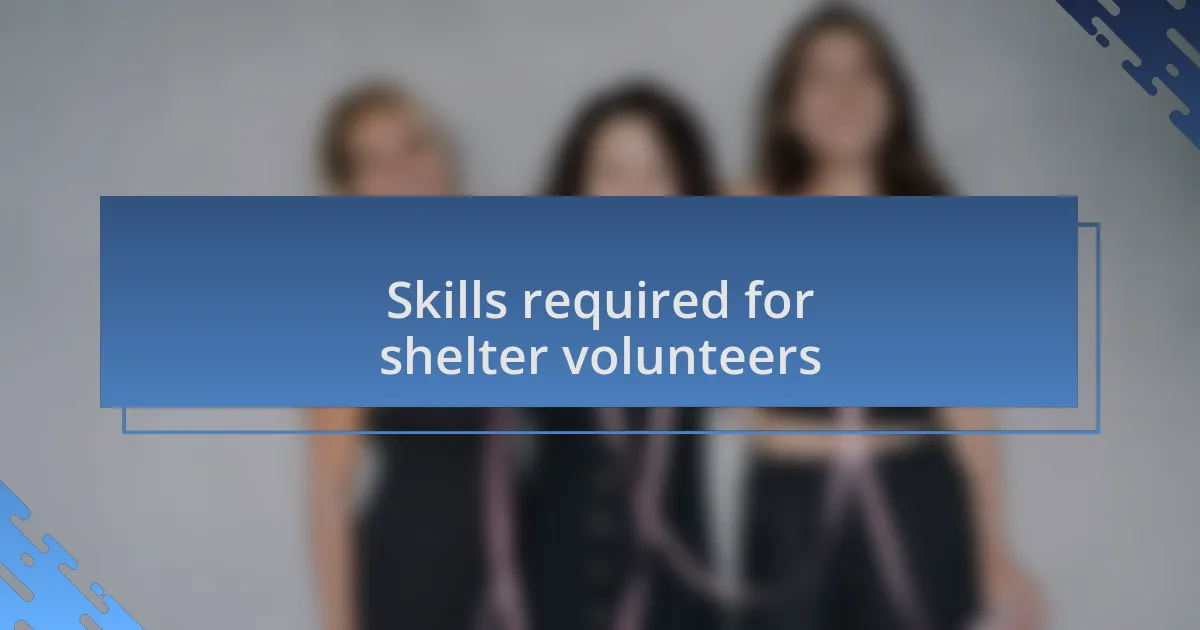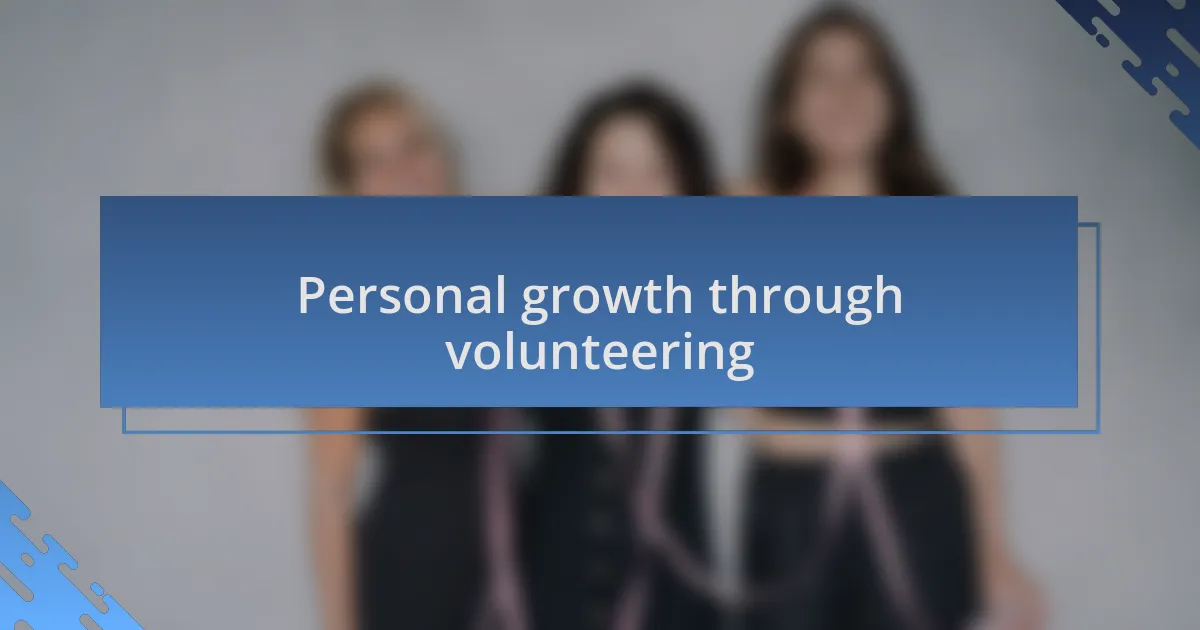Key takeaways:
- Homeless charity is vital, bridging vulnerability and hope, and fostering compassion through personal interactions.
- Shelter volunteering fulfills immediate needs, builds emotional connections, and inspires personal growth for both volunteers and those they help.
- Essential skills for shelter volunteers include effective communication, empathy, and adaptability to handle varying situations.
- Challenges in shelter work include emotional exhaustion, managing diverse personalities, and addressing resource limitations.

Understanding homeless charity
Homeless charity plays a vital role in our society, often serving as a bridge between vulnerability and hope. I remember a time when I met a gentleman at the shelter who shared how a simple meal and a warm conversation helped reignite his sense of self-worth. These interactions are essential; they remind us that behind every statistic, there’s a unique story that deserves compassion and understanding.
Many people might wonder, why do individuals find themselves homeless in the first place? In my experience volunteering, I’ve seen how unexpected job loss, mental health struggles, or family issues can cause a downward spiral. It opens your eyes to the reality that circumstances can change rapidly, emphasizing the need for community support and kindness.
Moreover, understanding homeless charity goes beyond just providing food and shelter. It’s about fostering an environment where individuals feel valued and heard. I recall a young woman who, after receiving assistance, began volunteering her time to help others in similar situations. This cycle of giving back illustrates the powerful impact of charity work, creating a ripple effect of hope and resilience in our communities.

Importance of shelter volunteering
Shelter volunteering is crucial because it provides immediate relief to those in need, helping to meet basic necessities like food and a safe place to sleep. I still remember the gratitude in a mother’s eyes when we registered her family for a warm meal; it wasn’t just about filling their stomachs but restoring a fragment of dignity. In those moments, I realized how essential volunteers are in fostering hope amidst despair.
The emotional connections formed during shelter volunteering can be life-changing, not only for the individuals receiving help but also for the volunteers themselves. There was a day when I sat with a former resident who shared his journey from homelessness to stability. Listening to him articulate his aspirations not only inspired me, but it also highlighted the profound impact that genuine compassion can have. Isn’t it remarkable how a simple act of kindness can transform lives and build resilience in the community?
Moreover, volunteering at a shelter cultivates a deeper understanding of societal issues surrounding homelessness. Each interaction provides insights that challenge misconceptions and enlighten perspectives. I often reflect on how volunteering has reshaped my worldview, igniting a passion within me to advocate for change. It’s a two-way street where helping others ultimately enriches your own life, creating a powerful cycle of empathy and support.

Skills required for shelter volunteers
Volunteering at a shelter requires essential communication skills. I remember a time when I had to approach a hesitant individual who looked uncertain about seeking help. By listening and engaging in a respectful conversation, I was able to build trust and encourage them to accept the support available. This experience made me realize that effective communication can break barriers and open doors for those who feel isolated.
Another crucial skill is empathy, which I believe is the heart of shelter volunteering. There was a moment when I shared a meal with someone who had just lost their job. Listening to their story, I felt their pain as if it were my own. I understood that my role wasn’t just to provide food but to create a safe space where they could express their fears and hopes. Empathy allows us to connect on a human level, fostering relationships that can help transform lives.
Lastly, adaptability is essential because no two days in a shelter are the same. I recall a chaotic evening when an unexpected influx of individuals arrived seeking shelter. Instead of panicking, I found myself creatively rearranging resources and collaborating with fellow volunteers to ensure everyone received what they needed. This ability to adjust swiftly can make a significant difference, highlighting the importance of being versatile and responsive in a shelter environment. How have you adapted in challenging situations?

Challenges faced in shelter work
Working in a shelter presents an array of challenges that can often be overlooked. One of the most pressing issues I encountered was managing emotional exhaustion. After weeks of hearing heart-wrenching stories of loss and struggle, I found myself feeling drained. There was a night when a woman shared her painful journey of losing her home and family. Listening to her, I felt a tidal wave of emotions; how was I supposed to support her while grappling with my own feelings? It’s a delicate balance that demands self-care to avoid burnout.
Another significant challenge lies in dealing with differing personalities. Every individual who walks through the shelter has a unique background, and sometimes, those differences can lead to conflicts. I remember a tense evening when two guests clashed over limited resources. The atmosphere thickened with tension as I stepped in to mediate. In that moment, I realized that understanding and patience are crucial. How do we ensure everyone feels valued amidst their struggles? It’s essential to create an environment that prioritizes open dialogue and respect.
Finally, resource limitations can be a constant hurdle. There were times when our shelter simply lacked enough supplies to meet the needs of those we served. I’ll never forget a particularly cold winter evening when we ran low on blankets. The sight of guests shivering reminds me that our efforts, as dedicated as they are, can sometimes fall short. It raises questions about how we can better advocate for resources and support. Have you ever faced a moment where you felt helpless despite your best efforts? It’s during those times that we must rally together, reminding ourselves of the impact we can still make.

Personal growth through volunteering
Participating in shelter volunteering has profoundly shaped my sense of purpose and self-awareness. I remember a Saturday morning when I was tasked with organizing a meal for guests. At first, I viewed it as just another chore, but as I served food and shared moments of laughter, I truly connected with individuals on their journeys. It hit me then; my role went far beyond simple tasks—it was about fostering community and empathy.
Volunteering challenges me to step outside my comfort zone, and with each interaction, I learn valuable lessons about resilience. I vividly recall speaking with a man who found solace in sharing his story. As he opened up about his struggles, I realized that my listening ear not only offered him comfort but also deepened my understanding of human strength. How often do we overlook the power of connection? Each story exchanged fills me with a sense of gratitude and a desire to stay engaged.
I’ve also seen my perspective shift dramatically, nurturing a newfound appreciation for life’s simplicities. One rainy afternoon, a young woman expressed her joy over receiving a warm jacket. It was a small gesture, yet her smile lit up the room. In that moment, I realized that true happiness often lies in the simplest things, and it’s the selfless acts that generate the most profound changes. How can we help others if we don’t understand their struggles? Volunteering has taught me empathy in ways I never expected, shaping not just the lives of others but also my own.